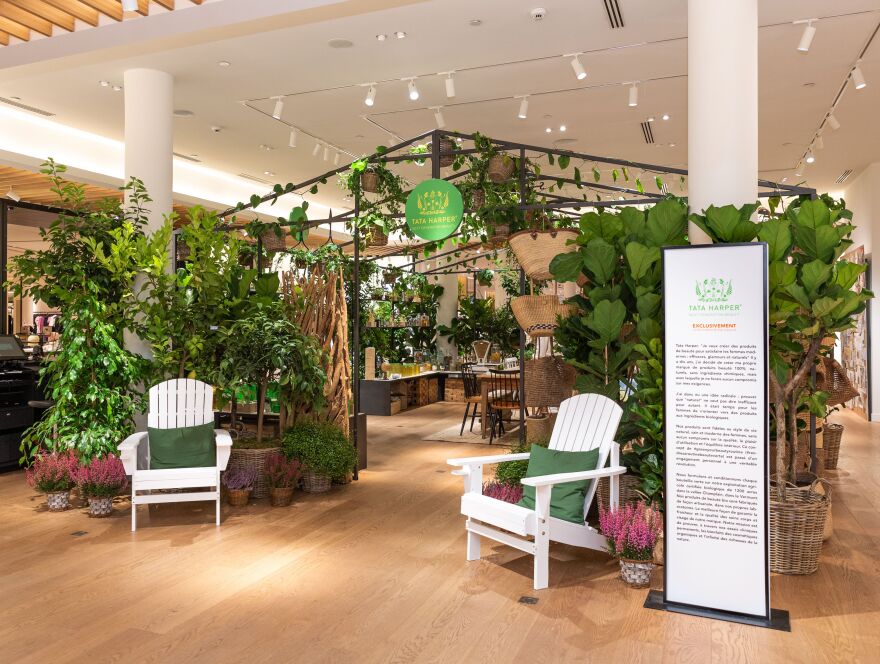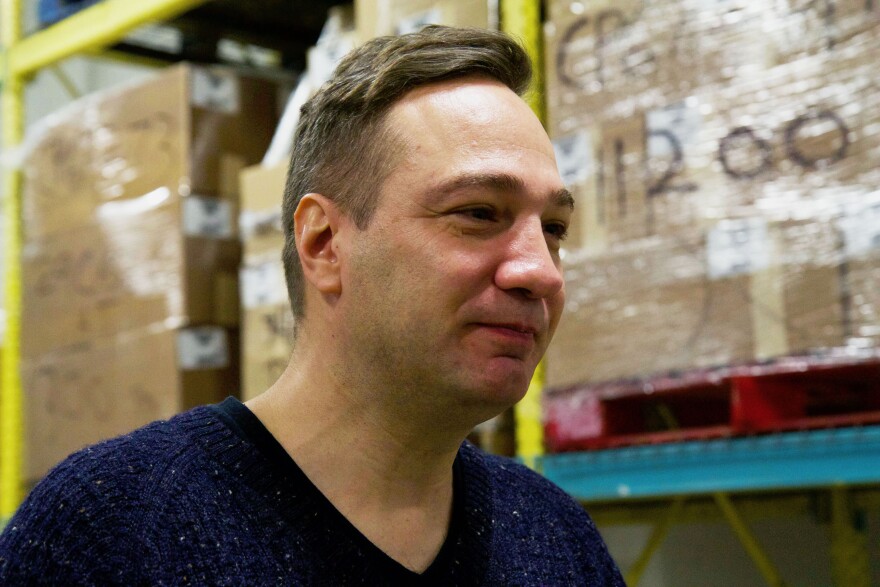Tanya Ocker hears this refrain a lot: Vermont is not a business-friendly state. But she wonders about the businesses that emphasize our "brand." Do they help our economy?
Note: Our show is made for the ear! As always, we recommend listening if you can.
"You have these local products that really emphasize the fact that they’re from Vermont,” Tanya says.
And some of them, like Tata Harper Skincare products and The Vermont Country Store catalogue, seem more popular outside Vermont than they are inside.

Tanya was wondering how to square these things, and so she wrote in to Brave Little State, VPR's people-powered journalism project. We answer questions about Vermont that have been submitted and voted on by you, our audience, because we think our journalism is better when you're a part of it. Tanya's question was:
“Are businesses that benefit from the Vermont ‘brand’ actually bringing money into the state?”
Tanya lives in Burlington and works remotely for a tech startup in California. She and I are friends, and I will confess that her constant needling did succeed in making me curious about Tata Harper. I hadn’t heard of Tata Harper before I met Tanya two years ago, not long after she moved to Vermont. Still, I want you, reader, to know: Tanya’s question won fair and square in a public voting round.
Subscribe to Brave Little State for free, and never miss an episode:
Loading...
In a nutshell, The Vermont Country Store sells nostalgic ephemera — products like the Pears soap your grandfather used, or the Reed’s peppermints you loved as a kid. Their tagline? “Purveyors of the practical and the hard- to-find.”
“We’re Yankees,” says Cabot Orton, eighth-generation Vermonter and fourth-generation owner of The Vermont Country Store. “We’re Vermonters.” (Full disclosure: They are also underwriters of VPR.)

There’s something strange and miraculous about opening up the paper catalog and seeing the exact nightgown you wore 30 years ago. But in case you think they sound like a small-potatoes business? The Vermont Country Store employs over 500 people year-round, and 1,000 at Christmastime. It has retail or business locations in Weston, Rockingham, North Clarendon, and Manchester.
And according Orton, the company gets a boost from consumers’ perception of Vermont.
“I think a lot of people view Vermont as this little paradise that time forgot in the mountains of New England,” he says.
That comes through in a 2013 Martha Stewart episode featuring the store:
“Not much has changed over the years in the tiny town of Weston, Vermont,” Stewart narrates to B-role of The Vermont Country Store’s downtown facade. “And, that’s a good thing.”
https://www.youtube.com/watch?v=0rCu05C0KYA
Of course, Orton is an enormous Vermont booster, and our conversation was largely a seminar on the state’s history of innovation. Vermonter John Deere, he says, had the nation’s first patent (in fact, Vermonter Samuel Hopkins was the first, with his potash-making invention). The entire machine tool industry was born here, Orten went on. By the time he finished speaking, Vermont was nearly responsible for ending World War II.
Nevertheless, Orton says, there are challenges to being a large company in such a small state.
“We can’t grow as much as we’d like to, because we can’t find any more labor,” he says. But while other businesses might leave town, Orton says that’s off the table for The Vermont Country Store. Vermont is too much a part of his company’s identity.
What's good for Vermont?
Tanya’s question is whether businesses like The Vermont Country Store and Tata Harper benefit the Vermont economy. To answer that question, I stop by the Vermont Department of Taxes. Douglas Farnham, a former military intelligence analyst, is the policy director and economist there.
“There are a number of ways that businesses contribute to Vermont’s bottom line,” he says. “I think the biggest one mostly likely is in the wages that they pay to their employees.”
Loading...
Last year, according to tax department statistics, the state’s corporate income tax revenue from all the business done in Vermont was $137,355,518. Income tax paid by residents was $875,425,522, more than six times the corporate tax revenue.
So, to answer Tanya’s question? Yes. By simply paying more than 500 salaries in Vermont, The Vermont Country Store is benefitting the state.
Tata Harper Skincare
OK. What about the other company Tanya mentioned? Tata Harper Skincare. If The Vermont Country Store traffics in nostalgia, Tata Harper leans hard on Vermont’s “purity.”

Tata Harper is a fast-growing luxury natural skincare brand that, according toMarketwatch, does about $65 million in sales every year. It’s owned by Graciela "Tata" Harper and her husband Henry, and it’s located in Shoreham, Vermont.
In an advertising video titled “Meet Tata Harper of Tata Harper Skincare,” for instance, Tata Harper states her name, her company, and the fact that she lives on a farm in Vermont. Her voice is layered over images of a woman in a cotton dress walking through a rolling green field, following frolicking children toward gentle hills in the distance.
https://www.youtube.com/watch?v=iQ5nPpBwNJE
The company’s packaging and website feature different versions of the following phrase: “Handmade with love in Vermont.” And for 10 years, company write-ups in Elle, Forbes and the L.A. Times have featured courtesy photos of Tata, luxuriating in straw hats and sundresses on their 1,200 acre Vermont farm.
Average Vermonters, however, are not Tata Harper Skincare’s target demographic. A single fluid ounce of their anti-aging serum will put you back $450. And the company keeps such a low profile in town that the two state senators representing Shoreham know next to nothing about it.
Loading...
“I’ve never been there,” says Bristol Sen. Christopher Bray. “Whereas a lot of other businesses, when they’re new to the area, one of their things is, join the chamber, or join the economic development corps, or host an open house. But I haven’t seen a thing.”
When I emailed the company, I received the following response: “Should this be a fit, someone from the team will reach out directly.” When I said I’d be stopping by in person, I didn’t hear back at all.
Field trip!
Naturally, our digital producer, Elodie Reed, our question-asker Tanya, and I decided to scope things out for ourselves. Our first stop is Tata Harper Skincare’s fulfillment center in Shelburne. I had found the address in the depths of the company website’s privacy policy.

After a lengthy wait, a slightly frazzled-looking man introduces himself as Luca.
Luca Del Carmine, originally from Italy, is head of communications at Tata Harper. Although there is a lot he says he’s not authorized to talk about, he does lead us into the warehouse and allow us to pepper him with questions. He wouldn’t say whether the brand really does $65 million in sales every year. But he is happy to tell us how valuable Vermont is to Tata Harper Skincare.
“That’s actually has been one of the most successful stories that we have been telling, especially now that we’re expanding globally,” he says. He explains that Tata Harper Skincare recently opened a pop-up shop in Paris’s largest department store, Le Bon Marché, with a display that featured a greenhouse and a mural about Vermont.

“We’re very proud to be Vermonters,” he tells us.
Our question asker Tanya is rapt. She presses him:
“I feel like I hear so much, folks don’t know about Vermont.”

“No no no,” he responds. “It’s very interesting, because when you go overseas, they call it the ‘Switzerland of the United States.’ It’s a state that’s very sensitive about organic, about farming, about doing things artisanal.”
According to Del Carmine, this luxury skincare brand does get value from Vermont.
But when I finally get ahold of Henry Harper, Tata Harper’s husband and co-CEO, he disagrees:
“Nobody is buying high performance skincare, natural skincare, because it's based on Vermont.”
If anything, he says, it’s an uphill battle. “It’s not the rocket fuel,” he goes on. “It’s something that has to be explained.”
So why does their brand feature Vermont so prominently?

“I think that if we were in New Mexico, we'd tell people about New Mexico,” Harper says.
Henry Harper explains that Tata Harper Skincare is located in Vermont because he, growing up in New York City, visited as a child and just fell in love with the place. And that, he does not dispute, is good news for Vermont.
“We've gotten I mean, millions of impressions where we have mentioned Vermont in the media, in magazines and blogs, when we don't have to,” he says. “I don't know how much that would cost in terms of an ad campaign, but it would be millions and millions and millions of dollars to, like, get that much exposure out there.”
More from VPR — Vermont's A Hard Place To Do Business? Darn Tough CEO Calls BS [January 4, 2020]
Of course, as far as tax economist Douglas Farnham can figure, it's the company's employee wages that matter most.
To that end, let me introduce to you Kaitlyn Schneider, one of the 25 or so people working at the Shelburne facility. Schneider is a chemical engineer who used to work for a big beverage manufacturer in Houston. Less than a year ago, the cosmetics enthusiast decided she wanted a new job.

“So I opened my medicine cabinet, and was like, ‘Alright, here’s where I’m going to apply,’” she tells us.
Schneider says she found an ad for a packaging engineering job at Tata Harper Skincare, and thought, “That’s me!”
Schneider doesn’t live in Texas anymore. She lives in Burlington. And let’s just say she’s young enough to be paying income taxes for at least another four decades — probably more.
So: Does Tata Harper Skincare benefit Vermont? So far, so good. But how many others are there like Schneider? To answer that question, our trio heads South.
On the farm
Our goal is to scope out the company’s manufacturing plant, and the verdant Shoreham farm featured in so many blogs and glossy magazines.
Of course, it is the middle of winter. Still, we are surprised to find an actual, bonafide farm. There are ducks, sheep, and cows. Tata Harper’s manufacturing plant is legitimately inside an old milking barn. Outside, we see about 37 cars, and inside, we count 54 lockers. But the company’s director of operations tells us she can’t speak with us, or give us a tour without advance warning, so we drive home.

At the end of the day, we have the answer to Tanya’s question. Tata Harper Skincare and The Vermont Country Store are benefitting the Vermont economy — and not just with free advertising.
Tax economist Douglas Farnham said the average Vermont employee pays $1,620 in taxes each year. We estimate Tata Harper employs about 80 people in Vermont, between the Shelburne and Shoreham locations. That’s $130,000 a year in revenue to the state. Income taxes from The Vermont Country Store’s over 500 employees, and from the seasonal labor they add at the holidays, is in the ballpark of $1 million.
Loading...

Brave Little State is a production of Vermont Public Radio. We have support from the VPR Innovation Fund. You can support us in many ways: Become a sustaining member of VPR, follow us on Twitter or Instagram at @bravestatevt, recommend our show to your pals or leave us a review on your favorite podcast app.
This episode was produced by Emily Corwin, with editing from Mark Davis. The show’s creator and host is Angela Evancie. Our digital producer is Elodie Reed. We have engineering support from Chris Albertine. Ty Gibbons composed our theme music; other music by Blue Dot Sessions.
Correction Jan. 24, 10:50 a.m. This story initially did not clarify that the first patent was, in fact, issued to Samuel Hopkins, a Vermonter who invented a process for making potash.





